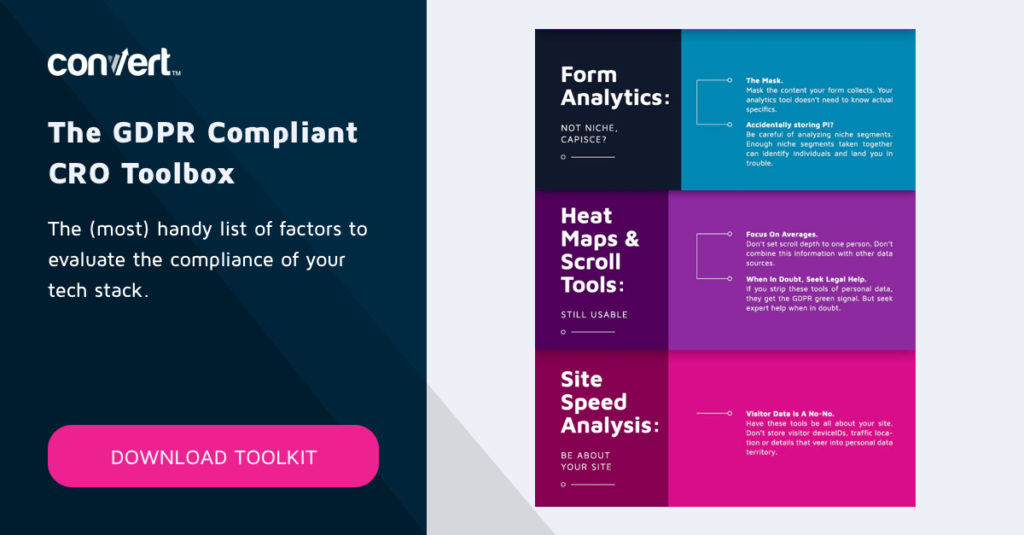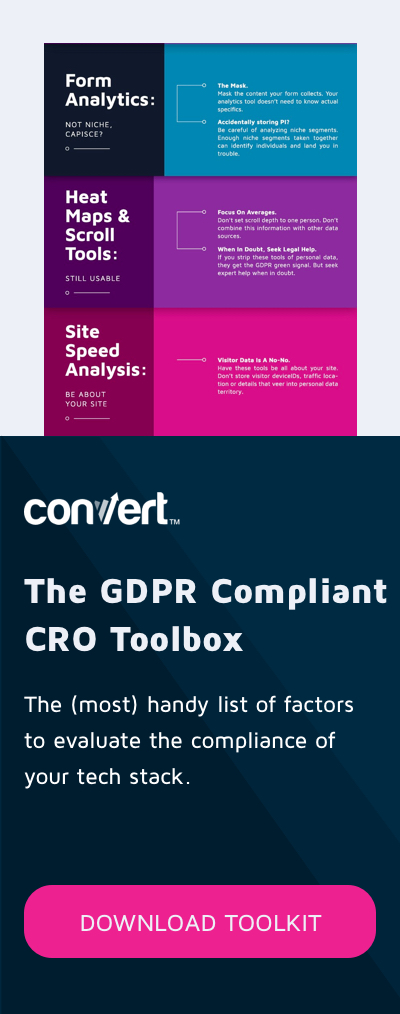Up to date February 19, 2020: A brand new replace from the CNIL states that A/B testing and viewers measurement are actually exempt from consent.
You would possibly suppose GDPR solely brought about a disruption when it got here into impact in Could 2018.
The reality is
Europe has been in turmoil all all through 2019 and it’s not good
information.
The French and UK information safety authorities (the CNIL and the ICO) up to date their steerage notes issued in July 2019, highlighting that analytics cookies (together with A/B testing and personalization) want specific consent earlier than being positioned on a customer’s system. They particularly consult with the GDPR when mentioning consent (like opt-ins). It have to be primarily based on energetic person motion, not on default settings.
In February 2020, the CNIL modified its stance on this matter (thanks Paul Schmitt for pointing this out to me). Although the ICO and the CNIL beforehand said that cookies for A/B testing and analytics wanted consent, the most recent tips (in French) say in any other case:
“Profit from the exemption from consent, topic to a sure variety of circumstances, cookies used for viewers measurement are exempt from consent. These circumstances, as specified within the tips on cookies and different trackers, are (1) inform customers of their use; (2) to provide them the ability to oppose it; (3) to restrict the system to the next functions solely: viewers measurement and A/B testing.”
Which means analytics instruments which might be arrange just for information assortment by a corporation (and never shared in any approach with third events) may be put in with out consent. This variation is perhaps a tough one for Google Analytics. This particular settlement from Mozilla pushed Google Analytics to not share its information with different providers. At the moment, it isn’t sure that this setting is offered for all customers. Nonetheless, if Europe is opening the door to analytics with out consent, I assume Google must comply with course and supply this characteristic to its European buyer base.
Though no different European nationwide privateness authorities got here with such additions to the ePrivacy Directive legal guidelines (that had been in place earlier than GDPR), this might need created a authorized vacuum between July 2020 and the second the brand new ePrivacy Laws will change the present Directive.
What occurred? What modified?
For a abstract of the principle adjustments to privateness legal guidelines in Europe, watch the video under (disclaimer: within the video I mistakenly talked about the adjustments had been carried out in 2018, when in truth they had been carried out in 2019).
The European
ePrivacy Directive “cookie legislation” of 2011 and the UK model, The Privateness and Digital Communications (EC Directive)
Laws of 2003 (“PECR”), have been just lately
reinterpreted by the ICO. This variation means asking for ‘consent’ to drop any
‘non-essential’ cookies, whether or not or not private information is collected.
In 2012, the ICO said that implied consent (i.e. an opt-out fairly than an opt-in) was permitted:
Implied consent has at all times been an inexpensive proposition within the context of knowledge safety legislation and privateness regulation and it stays so within the context of storage of data or entry to data utilizing cookies and related units.
On July 18, 2019, the French privateness authority (the CNIL) launched its new tips relating to using cookies. The foundations relevant to HTTP cookies additionally apply to many different monitoring applied sciences (“trackers”), together with native shared objects, terminal tools fingerprints, {hardware} identifiers, and identifiers generated by working methods. Identical to the ICO and GDPR tips, right here too there is no such thing as a separate resolution about using cookies, however fingerprinting now falls underneath consent.
However then the CNIL makes all of it a bit complicated by updating their Github web page. The CNIL’s newest tips state that viewers measurement and A/B testing are exempt from consent and may be positioned straight away (opt-out).
The European Knowledge
Safety Board (EDPB) issued a written opinion in March 2019
addressing the interaction between the ePrivacy Directive and the GDPR, as a result of
the GDPR doesn’t point out cookies and there’s a hole between the 2 legal guidelines.
Some interpreted the EDPB’s opinion as that means
that each one references to “consent” within the ePrivacy Directive imply consent as
outlined by the GDPR. For cookies, this implies you possibly can’t place cookies with out
individuals actively opting in.
So why did the ICO and in addition the CNIL change their guidances
a yr after GDPR got here into impact? Why did the knowledge relating to “opt-out”
of cookies change to consent opt-in in 13 months?
Now we have Planet49
to thank for that.
On 30 November 2017, Planet49, a German web site and firm, was delivered to courtroom over a number of questionable practices contemplating the GDPR and ePrivacy Directive.
Although we needed to look ahead to the outcomes (hooked up in full on the backside of the article), the ruling set the tone that clearer tips had been wanted for every nation.
Due to this ruling, the CNIL and the ICO started updating their tips to replicate how the present privateness legal guidelines cowl consent, data sharing and (analytics and monitoring) cookies. We must wait and see if the CNIL influences different European nations to permit viewers measurement and A/B testing cookies.
The Battle of the ‘Strictly Essential’ Cookie Exemption
When us A/B
testing corporations tailored GDPR practices, analytics and A/B testing cookies
might be offered to clients as important for a enterprise. As a substitute, the main target
was extra on ad-trackers.
These days, one would possibly disguise behind the strictly vital’ cookie exemption. I even heard somebody say “however our authorized crew mentioned we are able to place the Google Analytics cookie with out consent”. I used to be additionally in that camp till I learn the ICO’s new tips. Their website provides some good examples of what cookies are important for web site functioning and correct person interplay. With new tips popping out on a regular basis, strictly adhering to at least one facet or the opposite may be complicated. Some corporations are actually following the CNIL’s most up-to-date suggestions.
Within the examples under, a cookie is ‘strictly vital’ to offer a service to customers. In every case, exemptions apply and no consent is required:
- A cookie used to bear in mind the merchandise a person needs to purchase
after they go to the checkout or add items to their buying basket, - Cookies which might be important to
adjust to the GDPR’s safety precept for
an exercise the person has requested — for instance, in reference to on-line
banking providers, - Cookies that assist be sure that the content material of a web page masses
rapidly and successfully by distributing the workload throughout quite a few
computer systems (that is also known as ‘load balancing’ or ‘reverse
proxying”).
You will need to do not forget that what’s ‘strictly vital’ must be assessed from the person’s or subscriber’s viewpoint, not your personal. So, for instance, while you would possibly regard promoting cookies as ‘strictly vital’ as a result of they bring about in income that funds your service, they don’t seem to be ‘strictly vital’ from the person’s perspective.
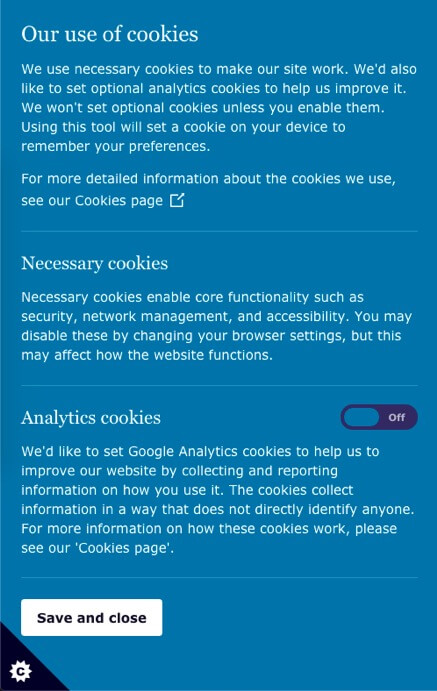

Cookies that the
ICO states want person consent (proactive opt-in by person motion) are for instance:
- Cookies used for analytics, e.g. to rely the variety of
distinctive visits to an internet site (that would come with personalization and A/B
testing), - First and third-party promoting cookies (together with these
used for operational functions associated to third-party promoting, corresponding to click on
fraud detection, analysis, product enchancment, and many others.), - Cookies used to acknowledge a person after they return to a
web site in order that the greeting they obtain may be tailor-made (personalization
is particularly talked about by the ICO).
The ECJ “Planet49” Judgment of 1 October 2019
In October 2019, the Courtroom of Justice of the European Union (the ‘CJEU’) dominated in its “Planet49” judgment that the GDPR-standard consent additionally applies to the setting of cookies underneath the ePrivacy Directive, following the interpretation that the CNIL and the ICO had carried out since July 2019.
Subsequently, energetic
and knowledgeable consent is required for putting cookies and profiling applied sciences
(like fingerprinting), together with promoting cookies (however not strictly
vital cookies).
Pre-ticked bins,
like those Planet49 tried to get away with, are usually not a sound means to get
consent.
We as a firm rebuilt our whole infrastructure to verify we complied with GDPR and saved no private information in cookies.
The ruling of the CJEU states that it doesn’t matter whether or not private information is collected by means of cookies. Consent have to be obtained even when cookie placement doesn’t contain processing private information. The controller ought to inform customers of the lifespan of every cookie and of any third events’ entry to data collected by means of such cookies, previous to getting their consent.
Any Non-consent Hope for Analytics and A/B Testing Cookies?
The ICO doesn’t distinguish between cookies used for analytics and people used for different functions, however the CNIL does.
Analytics cookies don’t fall inside the ‘strictly vital’ exemption for the ICO. This implies companies want to tell customers about analytics cookies and acquire consent for his or her use within the UK, whereas in France, the CNIL permits analytics (with limitations) and A/B testing with out consent.
The ICO (UK) describes cookies used for internet advertising or net analytics as non-essential, so that they require prior consent. This consists of first-party cookies and first-party cookies as set by third-party suppliers (learn Convert or Google Analytics). Convert complies with the CNIL’s laws as properly and doesn’t share datasets amongst clients and installs are per buyer solely, so A/B testing and personalization with holdback for testing is allowed.
The ICO steerage clearly states:
Consent is important for first-party analytics cookies, though they won’t look like as intrusive as others which may monitor a person throughout a number of websites or units.
Consent is important for first-party analytics cookies, though they won’t look like as intrusive as others which may monitor a person throughout a number of websites or units.
Though the ICO can not rule out the potential of formal motion in any space, this may occasionally not at all times be the case the place the setting of a first-party analytics cookie leads to a low degree of intrusiveness and low threat of hurt to people. Nonetheless, you also needs to word that the place you employ first-party analytics cookies supplied by a 3rd social gathering, this isn’t essentially going to be the case.
You must know there’s a grace interval to comply with the ICO’s PECR tips till July 2020.
If the
data collected about web site use is handed to a 3rd social gathering, this could
be made clear to customers. It also needs to be clear what this third social gathering does with the knowledge.
Relying in your
service, you might also supply customers the flexibility to change account settings to
restrict sharing data with third events, together with analytics suppliers.
(An analytics service may additionally present this performance, contemplate enabling
it, wherever applicable.) The controls supplied to the person must be
prominently displayed and never hidden away.
Finally, present clear data to customers about analytics cookies and search their consent or share the knowledge (outdated cookie banners). That is prone to contain displaying customers why these cookies are helpful to them — however you could make sure you aren’t pushing the person to decide on one possibility over one other.
On sure
elements, such steerage paperwork go additional than the present draft of the brand new
ePrivacy Regulation (dd. 4 October 2019), which is able to change the present
ePrivacy Directive (and present PECR and French legal guidelines). Within the present draft, it
permits operators to position first or third-party cookies on customers’ units
with out consent for “viewers measuring” (i.e. to investigate site visitors passing
by means of their web sites for optimizing the service).
If nonetheless unsure, right here’s a diagram from the ICO that explains using cookies very well.
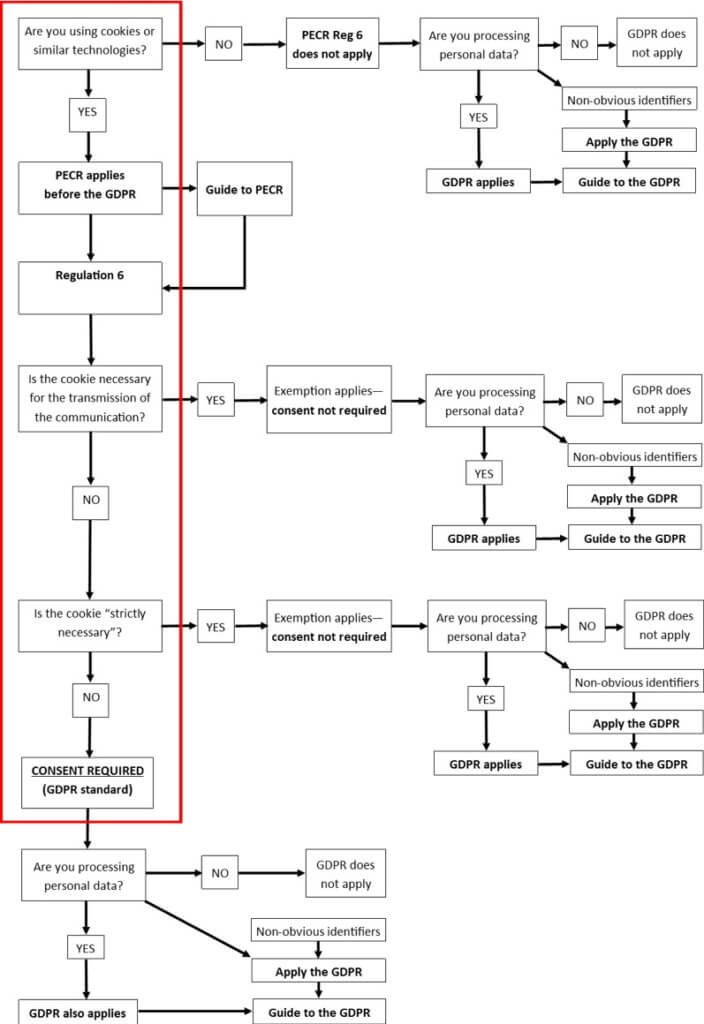

Give It to Me Straight
An issue that might come up right here is that corporations putting cookies will attempt to interpret the legislation in their very own approach. However though we make analytics, A/B testing and personalization software program, we are going to give it to you straight.
- The UK (ICO) and France (CNIL) privateness authorities modified their tips in July 2019 stating that analytics, A/B testing and personalization software program like Convert Experiences, Optimizely, AB Tasty, VWO, Adobe Goal, PageSense, OmniConvert, Google Optimize and the remainder all want opt-in utilizing consent to position first- and third-party cookies for his or her residents.
- France (CNIL) modified their Github web page with tips exempting A/B testing and fundamental analytics from cookie consent.
- Germany and Spain are following both the UK (ICO) or France (CNIL) and you’ll anticipate updates on their tips shortly.
- The Courtroom of Justice of the European Union (the ‘CJEU’) dominated in its “Planet49” judgment of October 2019 that the GDPR-standard consent additionally applies to the setting of cookies underneath the ePrivacy Directive. The ruling reaffirms that the UK and French tips must be adopted by all nationwide privateness authorities.
- The brand new legislation in draft known as the ePrivacy Laws that may change the ePrivacy Directive has a cookie exception for A/B testing, personalization, and analytics.
- It’s unlikely that the ICO or the CNIL will actively go after corporations that use first-party analytics, A/B testing and personalization presently. The ePrivacy Laws will doubtless take impact in (mid) 2021 and there’s a grace interval until July 2020. The scope of those organizations’ work may be very broad.
- Draw your personal conclusions primarily based on what we contemplate a good illustration of what occurred since July 2019 in Europe. Discuss to your authorized advisor. Don’t base your recommendation on a device that sells consent administration platforms (they need all consent), however neither from suppliers of analytics, A/B testing and personalization instruments… us and them.
I hope this
article helped shed some gentle on the adjustments taking place proper now in Europe.
Though it hurts
our enterprise mannequin, we at all times try to share the reality.
We wish our
optimization instruments for use to offer one of the best person expertise, in order that
customers get one of the best product web page, the least complicated menu, the shape that saves
them time to finish it.
We see web site
optimization as a noble craft, in one of the best curiosity of web site guests and
house owners (our paying clients) alike. We wish our clients to take privateness
critically and construct warnings and privateness proper into each layer of our instruments.
We solely retailer aggregated information — and no private information — into our instruments, for the
sake of compliance and privateness.
We really care. Though we is perhaps in a troublesome spot due to the present ICO and the ever-changing CNIL tips and the ePrivacy Laws, we all know that with full transparency, we would be the firm of selection for manufacturers that care about privateness and that customers can belief.
To this objective,
we launched a small pop-up that reveals
web site guests what personalizations and A/B testing they’re part of.
It’s an non-compulsory code clients can add to their world Javascript contained in the Convert Experiences A/B testing and personalization device (see the picture under on how that works).
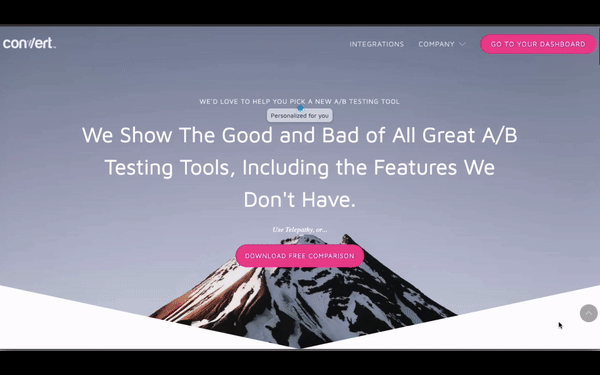

In case you’d like to debate privateness, the CNAME options we’re engaged on, or new authorized developments, please attain out to me on LinkedIn.
Judgment of the Courtroom (Grand Chamber) of 1 October 2019 (request for a preliminary ruling from the Bundesgerichtshof — Germany)
Bundesverband der Verbraucherzentralen und Verbraucherverbände — Verbraucherzentrale Bundesverband eV v Planet49 GmbH (supply Curia)
(Case C-673/17) 1
(Reference for a preliminary ruling — Directive 95/46/EC — Directive 2002/58/EC — Regulation (EU) 2016/679 — Processing of private information and safety of privateness within the digital communications sector — Cookies — Idea of consent of the info topic — Declaration of consent by way of a pre-ticked checkbox)
Language of the case: German
Referring courtroom
Bundesgerichtshof
Events to the principle proceedings
Applicant: Bundesverband der Verbraucherzentralen und Verbraucherverbände — Verbraucherzentrale Bundesverband eV
Defendant: Planet49 GmbH
Operative a part of the judgment
Article 2(f) and of Article 5(3) of Directive 2002/58/EC of the European Parliament and of the Council of 12 July 2002 regarding the processing of private information and the safety of privateness within the digital communications sector (Directive on privateness and digital communications), as amended by Directive 2009/136/EC of the European Parliament and of the Council of 25 November 2009, learn along side Article 2(h) of Directive 95/46/EC of the European Parliament and of the Council of 24 October 1995 on the safety of people with regard to the processing of private information and on the free motion of such information and Article 4(11) and Article 6(1)(a) of Regulation (EU) 2016/679 of the European Parliament and of the Council of 27 April 2016 on the safety of pure individuals with regard to the processing of private information and on the free motion of such information, and repealing Directive 95/46 (Basic Knowledge Safety Regulation), have to be interpreted as that means that the consent referred to in these provisions is just not validly constituted if, within the type of cookies, the storage of data or entry to data already saved in an internet site person’s terminal tools is permitted by the use of a pre-checked checkbox which the person should deselect to refuse his or her consent.
Article 2(f) and Article 5(3) of Directive 2002/58, as amended by Directive 2009/136, learn along side Article 2(h) of Directive 95/46 and Article 4(11) and Article 6(1)(a) of Regulation 2016/679, are to not be interpreted in another way in keeping with whether or not or not the knowledge saved or accessed on an internet site person’s terminal tools is private information inside the that means of Directive 95/46 and Regulation 2016/679.
Article 5(3) of Directive 2002/58, as amended by Directive 2009/136, have to be interpreted as that means that the knowledge that the service supplier should give to an internet site person consists of the length of the operation of cookies and whether or not or not third events might have entry to these cookies.
____________
1 OJ C 112, 26.3.2018.
Initially printed Could 25, 2020 – Up to date November 10, 2022
Cellular studying?
Authors
Dennis van der Heijden
Co-founder & CEO of Convert, passionate group builder and out-of-the-box thinker.
Editors

Carmen Apostu
In her position as Head of Content material at Convert, Carmen is devoted to delivering top-notch content material that individuals can’t assist however learn by means of. Join with Carmen on LinkedIn for any inquiries or requests.


